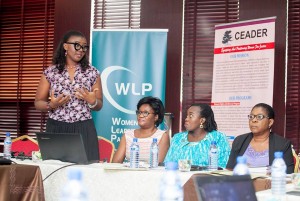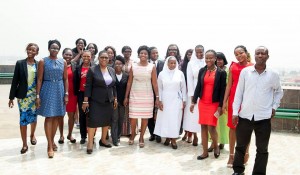
At a February 14, 2017 workshop held in Lagos, SPACES FOR CHANGE presented the research findings to a broad spectrum of gender experts and stakeholders drawn from both the public and private sectors, involved in the campaign for gender equality and gender justice in Nigeria. The twenty (22) workshop participants comprise of independent researchers, legal practitioners, NGO leaders and advocates, state officials, faith-based gender advocates, representatives of the media, slumdwellers, religious and HIV communities.
The research proceeds on the premise that there are linkages between the laws regulating relations in the family and violence against women. In establishing the connection between family law and VAW, the research examined the historical developments in family law reform, particularly since the post-Independence era when the country began the process of transforming inherited colonial structures into truly localized administrative and governance frameworks reflective of local political realities and cultural priorities. This provides a context in which to examine and understand the dispositional factors and the socio-cultural attitudes which influence both gender hierarchy and the phenomenon of violence against women in Nigeria.
The research further charted the spatial distribution of gender-based violence in the two different regions of Nigeria—the south and the north—paying particular attention to the formal and religious governance arrangements that regulate gender and family relations. The compiled data enabled the selection of case studies and the development of an overall typology of gender-based violence occurring within the family, in the community, and in other intimate relationships across the two regional divides. Spotlighting the most consequential issues demanding action is necessary to both improve understanding of the magnitude and nature of the problem(s) at the regional levels, and for developing holistic responses and measures to combat discrimination against women and girls in Nigeria.
The progress in implementation of the legal reforms has been slow, prompting many to question whether the array of constitutional and legislative prescriptions of substantive equality actually translate to locally-enforceable guarantees at the state, national and international levels. No doubt the reform of laws impacting women in the family has neither overturned the disproportionate ways cultural norms affect women, nor uprooted the ingrained patriarchal ideologies that lower women’s status and decrease their autonomy. The result is an upsurge in the nature and scope of the systematic patterns of gender-based violence witnessed across the two regions. Evidence from the research showed that legal reforms alone may not be able to unseat religiously-sanctioned practices pertaining to personal status and family relationships which entrench gender inequality.
However, this is not all. Behind these obstacles constraining the enjoyment of women’s rights lie many more opportunities for reform. This research explores those untapped opportunities, including the process and dynamics of reform itself, allowing the extraction of a wide range of potential lessons for future reformers. Against this backdrop, the research identified an array of innovative gateways with significant potential to bring about substantive equality and more sustainable changes to relations within the family. Five innovative opportunities for reform were identified, extensively analyzed and applied to various family law scenarios in Nigeria. If scaled up, they not only hold enormous prospects for widening the space for reforms, but also wield strong influence on political and judicial processes who bear the primary responsibility for adopting and implementing the changes to legal norms on gender relations. What the research has now done is to profile the precedents and open space for new conversations. It goes further to present an array of approaches and considerations for using qualitative research findings as evidence for modifying laws, customs and religious practices harmful to the enjoyment of women’s rights in the family.





















